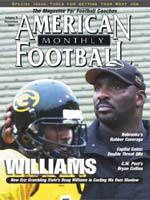AMERICAN FOOTBALL MONTHLY THE #1 RESOURCE FOR FOOTBALL COACHES
Article CategoriesAFM Magazine
|
The Way It Used To BeFootball coaching legends share their experiences on the gridiron before laptops, charter jets and mega-million dollar facilitiesby: Aaron S. Lee © More from this issue If there is one constant, it is that there are no constants. Over time, everything changes and nothing remains quite the same. Never is this more evident than in the profession of coaching football. American Football Monthly recently sat down with a few of the game’s greatest coaches for a peek inside the ever-changing world of football. From their first job to their last, their first championship season to their first losing season, AFM has captured it all – in their words. Men like Lee Corso, Barry Switzer and Grant Teaff have provided AFM with an exclusive journey down memory lane. Maybe you can’t walk in their shoes, but perhaps you can at least try them on. Over the course of the next few months, A....The full article can only be seen by subscribers. Subscribe today!
|
|
|||||||
| HOME |
MAGAZINE |
SUBSCRIBE | ONLINE COLUMNISTS | COACHING VIDEOS |
Copyright 2025, AmericanFootballMonthly.com
All Rights Reserved





